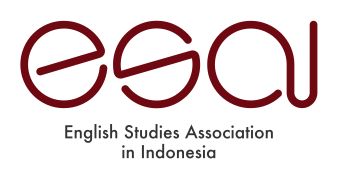ELICITATION TECHNIQUE EMPLOYED BY EFL TEACHERS IN MOTIVATING JUNIOR HIGH SCHOOL STUDENTS TO SPEAK
Abstract
This study was inspired by the lack of teaching techniques that could accommodate students’ speaking skills as the main indicator determining students’ success in learning English. The elicitation technique could be used by teachers to initiate students to speak during the learning process. A descriptive qualitative method was employed which aimed to investigate the types of elicitation techniques used, the way to implement them, and students’ responses to the elicitation techniques employed by the English teachers in motivating students to speak. There were two English teachers and ten students consisting of seventh and eighth grades involved as the participants in this study. Checklist, classroom observation, interview, and video audio recordings were conducted as the methods of data collection by means of observation checklist, observation sheet, interview guide, as well as video-audio recorders. The data were analyzed based on the category of elicitation techniques proposed by Cross (1992). The findings showed that there were 10 types of elicitation techniques used. Speech Prompts 44.5 (28.7%), WH Short-Answer Question 42.5 (27.4%), dan Yes-No Question 37 (23.9%) were the most frequent types used by the teachers in eliciting students to speak. In addition, it was also revealed that the elicitation techniques were employed by the teachers in all the teaching segments. Eight out of ten students positively responded by feeling motivated to speak in English. This indicated that the elicitation techniques used by the teachers could motivate students to speak in English.
Keywords
Full Text:
PDFReferences
Almohizea, N. I. (2018). An investigation of oral interaction in English as a foreign language classroom. International Journal of Language and Linguistics, 6(3), 51–60. https://doi.org/10.11648/j.ijll.20180603.11
Ayouni, N., & Sukny, M. El. (2022). An analysis on elicitation as corrective feedback to students’ grammar errors. Journal of English Teaching and Linguistics, 3(2), 109–115. https://ejournal.unida-aceh.ac.id/index.php/jetli
Cross, D. (1992). A Practical Handbook of Language Teaching. New York: Prentice Hall.
Erianti, A., Akib, E., & Baso, F. A. (2018). Analysis of teachers’ questioning strategies in elt (English Language Teaching) the classroom interaction at eleventh grade SMA Muhammadiyah 1 Unismuh Makassar. Exposure : Jurnal Pendidikan Bahasa Dan Sastra Inggris, 7(1), 58. https://doi.org/10.26618/exposure.v7i1.1348
Fakhomah, D. N., & Utami, M. S. (2019). Pre-service English teacher perception about higher order thinking skills (HOTS) in 21st-century learning. International Journal of Indonesian Education and Teaching, 3(1), 41–49. https://doi.org/10.24071/ijiet.v3i1.1676
Fitria, Y., & Sofyawati, E. D. (2018). The use of elicitation in improving students’ speaking skill. English Education and Applied Linguistics Journal, 1(3), 209–214. https://journal.institutpendidikan.ac.id/index.php/eeal/article/view/1701
Halim, S., & Halim, T. (2019). Elicitation: A powerful diagnostic tool for actively involving learners in the learning process. Arab World English Journal, December(1), 115–126. https://doi.org/10.24093/awej/efl1.9
Husna, R., & Amri, Z. (2018). The use of elicitation technique in teaching speaking to junior high school students. Journal of English Language Teaching, 7(4), 611-621.
Kamilah, F., & Cahyani, L. (2020). Elicitation techniques used by a pre-service teacher in EFL classroom. Journal JEOPALT, 8(02), 13–23.
https://doi.org/10.35194/jj.v8i2.1004
Mandasari, M., Syarif, H., & Refnaldi, R. (2019). Elicitation techniques in classroom interaction used by English teachers at SMAN 1 2x11 Kayutanam. Komposisi: Jurnal Pendidikan Bahasa, Sastra, Dan Seni, 20(1), 1–11. https://doi.org/10.24036/komposisi.v20i1.10036
Miles, M. B., Huberman, A. M., & Saldaña, J. (2014). Qualitative Data Analysis: A Methods Sourcebook (3rd ed.). SAGE Publications.
Motallebzadeh, K., Ahmadi, F., & Hosseinnia, M. (2018). Relationship between 21st century skills, speaking and writing skills: A structural equation modelling approach. International Journal of Instruction, 11(3), 265-276. https://doi.org/10.12973/iji.2018.11319a
Nargiza, Y. (2021). The involvement of teacher’s: Calling students to speak. International Journal of Academic Multidisciplinary Research (IJAMR), 5(2), 68–71.
Nova, F. (2019). An analysis of elicitation technique used by the English teacher in teaching speaking skill. Research in English and Education (READ), 4(3), 129–137. http://www.jim.unsyiah.ac.id/READ/article/view/14117
Omari, H. A. (2018). Analysis of the types of classroom questions which Jordanian English language teachers ask. Modern Applied Science, 12(4), 1. https://doi.org/10.5539/mas.v12n4p1
Oryza, F., Asad, F., Soraya, I., Islam, U., Sunan, N., & Surabaya, A. (2022). Presentation-practice-production (PPP): elicitation technique used by the English teacher to teach grammar. Foster JELT: Journal of English Language Teaching, 3(3), 149–159.
Ramli, M. J., Hidayati, R., & Hizbullah, M. (2021). The use of elicitation technique in improving student’s speaking skill. Linguistics and English Languages Teaching Studies, 2(1), 1–28.
Ratminingsih, N., Batan, I., & Mahayanti, N. S. (2018). Reflective Teaching. Singaraja.
Thompson, M., Leonard, G., Mikeska, J. N., Lottero-Perdue, P. S., Maltese, A. V., Pereira, G., Hillaire, G., Waldron, R., Slama, R., & Reich, J. (2022). Eliciting learner knowledge: enabling focused practice through an open-source online tool. Behavioral Sciences, 12(9), 1–17. https://doi.org/10.3390/bs12090324
Usman, B., Ayouni, N., Samad, I., & Fitriani, S. (2018). Teachers’ elicitation: inviting students to speak. Journal of English Education, Literature, and Culture, 3(1), 51-65. http://dx.doi.org/10.30659/e.3.1.51-65
Vahdat, Z. A., & Tavassoli, K. (2019). A comparison of the effects of task repetition and elicitation techniques on efl learners’ expository and descriptive writing. Journal of Language Horizons, Alzahra University, 3(1), 2019. https://doi.org/10.22051/lghor.2019.27890.1173
DOI: http://dx.doi.org/10.30813/jelc.v13i2.3684
Refbacks
- There are currently no refbacks.



2.jpg)



